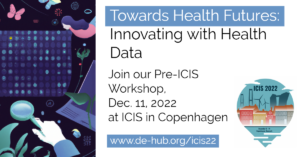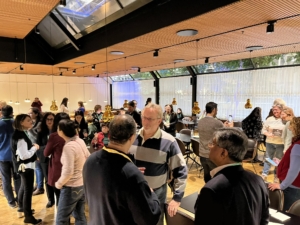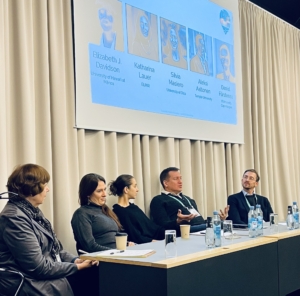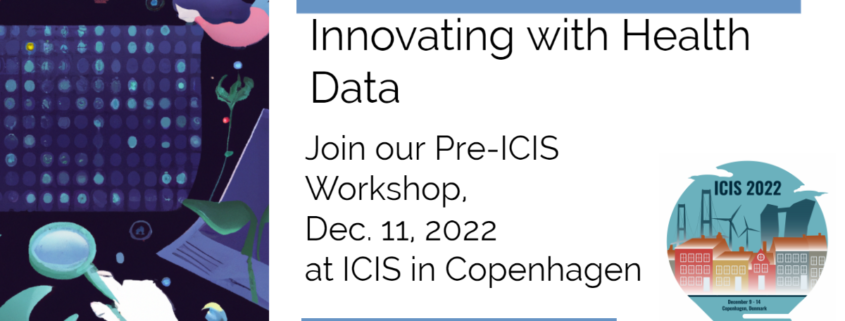ESR Fatma Sümeyra Doğan at workshop “Towards Health Futures: Innovating with Health Data”

ESR Fatma Sümeyra Doğan attended a conference workshop held in Copenhagen on 11th December 2022 titled: Towards Health Futures: Innovating with Health Data as part of the International Conference on Information Systems (ICIS).  The program had three parts and the first part started with two presentations from professionals who working on health data. The first presentation was given by Katharina Lauer from COVID-19 Data Portal by the ELIXIR project. In her presentation, we received insights about challenges they faced during the pandemic, for instance, lack of standardization and different interpretation of law across data-sharing infrastructures. The second presentation was given by Nikolas Molyndris from Decentriq which is a newly founded company to enable secure data connections between different partners by using privacy-enhancing technologies such as confidential computing and federated learning.
The program had three parts and the first part started with two presentations from professionals who working on health data. The first presentation was given by Katharina Lauer from COVID-19 Data Portal by the ELIXIR project. In her presentation, we received insights about challenges they faced during the pandemic, for instance, lack of standardization and different interpretation of law across data-sharing infrastructures. The second presentation was given by Nikolas Molyndris from Decentriq which is a newly founded company to enable secure data connections between different partners by using privacy-enhancing technologies such as confidential computing and federated learning.
The program continued with the panel session with esteemed scholars Elizabeth J. Davidson, Katharina Lauer, Silvia Masiero, Aleksi Aaltonen and Daniel Fürstenau in moderation of Hannes Rothe. During the panel session discussion continued around the different aspects of health data in numerous disciplines. Aleksi Aaltonen pointed out that clinicians’ main focus is on the treatment of the patients however, we should shift our focus also to data collection and interpretation as this will benefit us more in the future so clinicians should be educated in this manner. Silvia Masiero mentioned that from health data, we can learn about society as well as the patient. In this sense, being discriminated against while receiving health services will also have a secondary effect. She also talked about this concept, which she defines as data injustice, and that we need to make efforts to reduce this effect. Katharina Lauer remarked on the different layers of health data and a novel area called ‘planetary health’ which we will be hearing more about in the future as a result of climate change and migrations due to these changes. Elizabeth J. Davidson referred that health data is integrated into every part of human existence and thus has enormous importance. In this regard, while technology is advancing and sharing data is getting easier day by day, hesitations around sharing must be evaluated carefully. Daniel Fürstenau flagged up the inconstant nature of health data and this feature must not be disregarded while collecting and processing health data.
In this sense, being discriminated against while receiving health services will also have a secondary effect. She also talked about this concept, which she defines as data injustice, and that we need to make efforts to reduce this effect. Katharina Lauer remarked on the different layers of health data and a novel area called ‘planetary health’ which we will be hearing more about in the future as a result of climate change and migrations due to these changes. Elizabeth J. Davidson referred that health data is integrated into every part of human existence and thus has enormous importance. In this regard, while technology is advancing and sharing data is getting easier day by day, hesitations around sharing must be evaluated carefully. Daniel Fürstenau flagged up the inconstant nature of health data and this feature must not be disregarded while collecting and processing health data.
After the panel session, Fatma presented her work in the roundtable session. Her study titled: Secondary Use of Health Data: A Comparative Analysis of GDPR and European Health Data Space. She focused on provisions of secondary use in the European Health Data Space and how these provisions will interplay with GDPR and made a comparison of the two legislations. Her starting point was as being a newly introduced term, how should we interpret the secondary use under GDPR and EHDS proposal. The fact that even EHDS does not offer us a definition was the main point of her discussion and she received valuable feedback after her presentation from the other participants of the roundtable.





